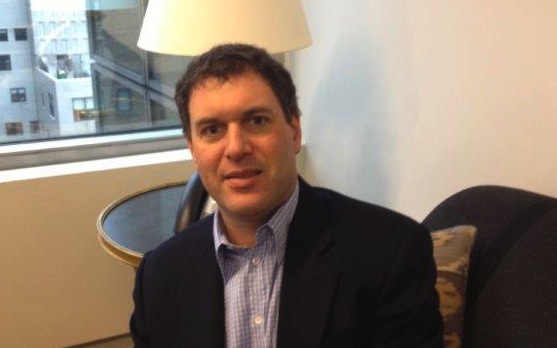Who’s Here: Jonathan Sobel, Entrepreneur

Jonathan Sobel was born and raised the son of a physician in Ho-Ho-Kus, a small town in New Jersey located in the northern part of that state near the New York border. He’s had a spectacular career in the financial world, joining Goldman Sachs when he was just finishing his junior year at Columbia University at the age of 20, and rising to become, at 31, a Partner Managing Director and then Global Head of the firm’s mortgage department, Global Head of Global Bank Group, Chief Risk Officer for Goldman Sachs Asset Management.
For many years, he has been coming out to the Hamptons, initially when he was single in his college years and more recently as a homeowner. Currently he lives with his wife and family both in Manhattan and in a home in Sagaponack that he had designed by the late architect Charles Gwathmey. He thinks the Hamptons is a great place for his kids to be and they are all out here often. He’s an active philanthropist, a tennis player and, of all things, a collector of early technological gadgets and products that, for the most part, he finds on eBay.
I interviewed him sitting in his glass-and-mahogany offices in a big Manhattan skyscraper on Madison Avenue, and he became quite animated as he talked about this.
For example, he owns a Betamax, the very first commercial device that could record television programs on videotape to watch later. He owns the first Apple Mac. He owns an old Leica camera and an old Hasselblad.
“I also have a Polaroid XS70,” he told me.
“This was the first fully automatic instant camera Polaroid ever made. I also own a Pulsar watch, the first digital watch on the market, and an early Olivetti portable typewriter designed by Ettore Sottsass. I buy things that are revolutionary, but are also sometimes beautifully designed works of art as well. An Olivetti portable is in New York’s Museum of Modern Art.”
These aren’t specifically the first of these things ever made. Those you would have to buy at a very high price at auction at Sotheby’s when they came up. No, Sobel’s hobby is about admiration, an admiration of things technological that changed the world. He has most of these things on shelves in his house in Sagaponack.
(Let it be said that I also have that first Olivetti portable typewriter. For many years, I lugged it around while traveling. Stories for this newspaper were written on four continents. And the Olivetti has a place of honor on a shelf in my house too.)
All this is of interest because Jonathan Sobel, in the last few years, retired from Goldman Sachs and entered the business world here on eastern Long Island, buying not only property, but also four car dealerships in Southampton. They are Mini, BMW, and a Porsche and Audi dealership. Almost any of the vehicles sold could be part of his collection. They are like fine watches.
I had to ask.
“What’s your personal favorite car?”
“Everything German made is of the highest quality. But if I had to choose? It would be the new Porsche 911. This is an amazing, iconic car.”
I think it fair to say that Jonathan Sobel, now 46, was made to enter the financial world. He was enrolled as a boy in Dwight Englewood, a private prep school in New Jersey, and when he was old enough, he found himself not only good at math and science but also fascinated with it. When he enrolled at Columbia University as a freshman (he graduated in the class of ’88), he initially thought to get a degree in Engineering, figuring that would be the best way to further his career in technology. But he soon changed his major. His degree is in Economics.
“It’s quite amazing to me,” I said, “that you got a job at Goldman Sachs while you were still in college.”
“I had learned a lot. But all of it was academic. Goldman Sachs has a summer jobs program for college kids. It’s their kind of apprenticeship. We were hired as researchers. And after that summer, I stayed working part-time with Goldman during my senior year, finishing up. I stayed another 20 years.”
One night while at Goldman, Sobel attended a party and was introduced to Marcia Dunn, a woman he fell in love with. She was a medical student. A few years later, they married, and they have two children, a son now 12 and a daughter now 8. Dunn now has an ophthalmology practice in Manhattan and Westchester.
The Sobels are very active in philanthropy. Jonathan Sobel is a Trustee of the Hospital for Special Surgery, the Whitney Museum, the Dalton School and the Public Art Fund. He’s also a member of the Executive Committee of the Columbia College Alumni Association. And he was the recipient of Columbia College’s Alumni Achievement Award, their Dean’s Award for Service to the college. He’s also a University benefactor.
“What was the first car you ever bought?” I asked.
“That was an old Mercedes convertible from the 1980s. I bought it used.”
“The second car?”
“Porsche 911.”
I asked him how he came to leave Goldman Sachs. He gave notice in 2008 and left in early 2009. “When Lehman Brothers went bankrupt that year, it created turbulence in the market I had never seen before. And the players in the industry were acting out of fear rather than rational behavior. I was a partner. I had been there 20 years. I would never run the company. And I thought that the chaos would create great investment opportunities.”
That year, he formed a partnership with Gerald Ford, a successful financial services entrepreneur in Dallas who was for many years the Chairman of the Board of Golden State Bankcorp, the second largest thrift institution in the nation. Ford sold it to Citicorp for $6 billion in 2002. The company Ford formed with Sobel, DTF Holdings, invests in many projects such as banks, insurance companies and other institutions around the nation.



